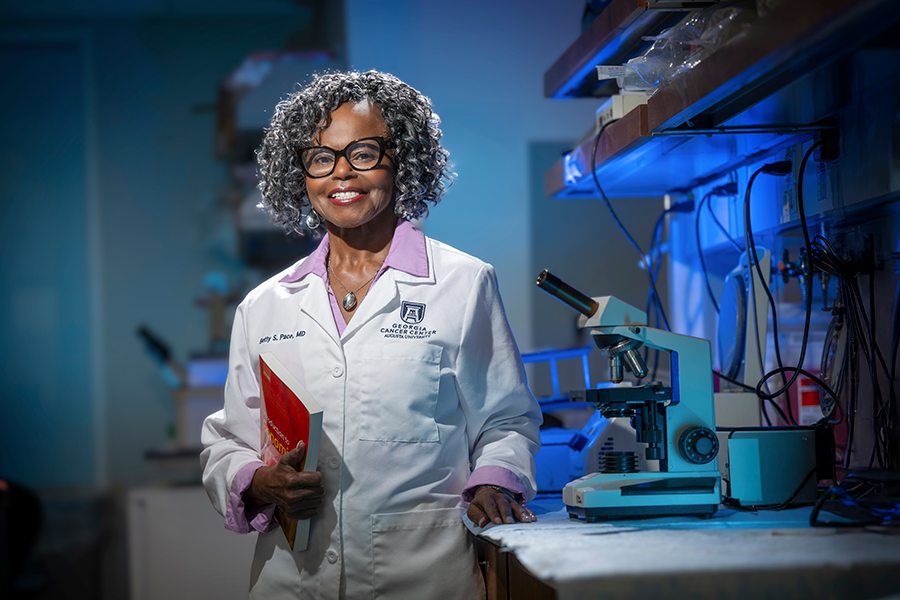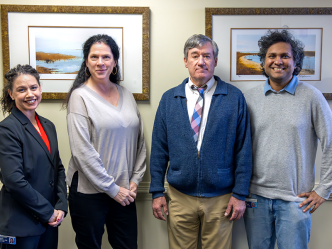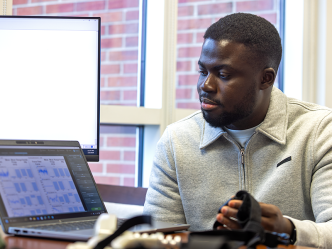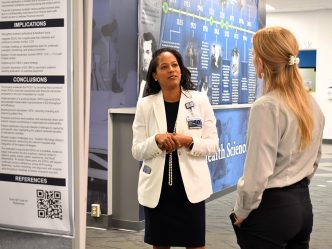For hematologist Betty S. Pace, MD, life has always been about helping others.
“I believe very, very strongly in paying it forward,” said Pace, the Francis J. Tedesco Distinguished Chair in Pediatric Hematology/Oncology at Augusta University’s Medical College of Georgia. “When you do good things for people, good things come to you.”
The nationally recognized physician-scientist and mentor recently established the Betty S. Pace, MD, Scholarship through a gift to the Medical College of Georgia that provides financial support and mentoring opportunities for medical students, particularly those from disadvantaged backgrounds.
“We must invest in our young people. It’s important. We need to learn how to let go and give to the next generation.”
Betty S. Pace, MD, the Francis J. Tedesco Distinguished Chair in Pediatric Hematology/Oncology at Augusta University’s Medical College of Georgia
“I love helping people; it is so satisfying,” said Pace, who has devoted her entire career – more than 40 years – to fighting sickle cell disease, a life-threatening blood disorder that causes severe pain, infections and organ damage, and disproportionately affects Black Americans.
“In middle school, one of my good friends was afflicted with sickle cell disease,” said Pace, who grew up in Racine, Wisconsin, in the 1960s. “Phyllis suffered a severe stroke back in those days, and she was very debilitated and later died. The average life expectancy was 19, if you made it that long. So that impacted me, and from that moment on, I decided I needed to do something to help people who had sickle cell disease. That pretty much directed my path.”
Number 10 in a line of 15 children, Pace was the first in her family to go to college. Though she planned to pursue a PhD in biochemistry and study sickle cell disease in a laboratory, a college acquaintance recognized her compassionate nature and encouraged Pace to become a doctor so she could care for patients.
“That’s when I changed my decision and followed the medical path,” said Pace.
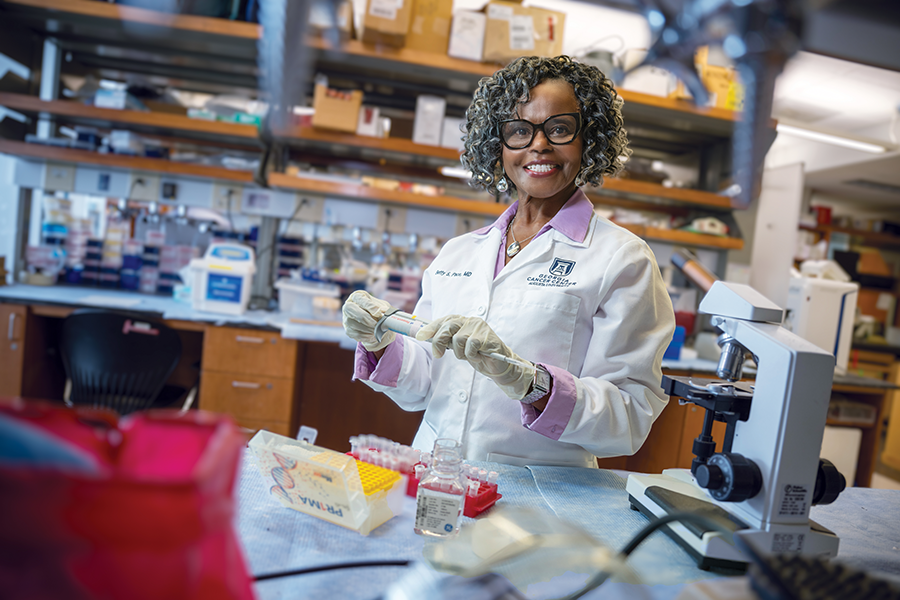
After earning her MD at the Medical College of Wisconsin in 1981, she began a pediatric residency at MCW’s Children’s Hospital, where she participated in a groundbreaking National Institutes of Health study on the efficacy of penicillin as a preventive measure for pneumonia in babies with sickle cell disease.
Children under the age of 3 with sickle cell are at an increased risk of life-threatening pneumococcal infection due to their absent or non-functional spleens and a diminished immune response. Essentially, Pace and a cohort of investigators across the country concluded that penicillin could significantly improve survival rates for children with sickle cell disease. The study, which was published in the New England Journal of Medicine in June 1986, was the first of more than 100 sickle cell-related research publications involving Pace over the years.
“Eventually, I went back to my first love, which was sickle cell research,” said Pace. “I had the option of becoming a physician-scientist, so that is what I did.”
Pace completed a pediatric hematology/oncology fellowship at the University of Colorado Health Sciences Center in Denver (1987-90), followed by a postdoctoral research fellowship at the University of Washington in Seattle (1990-94). She spent the next eight years at the University of South Alabama in Mobile, Alabama, where she also served as associate director of the university’s Comprehensive Sickle Cell Center. Pace moved to Texas in 2003, where she was associate director and later director of the UTD Sickle Cell Research Center and a tenured professor.
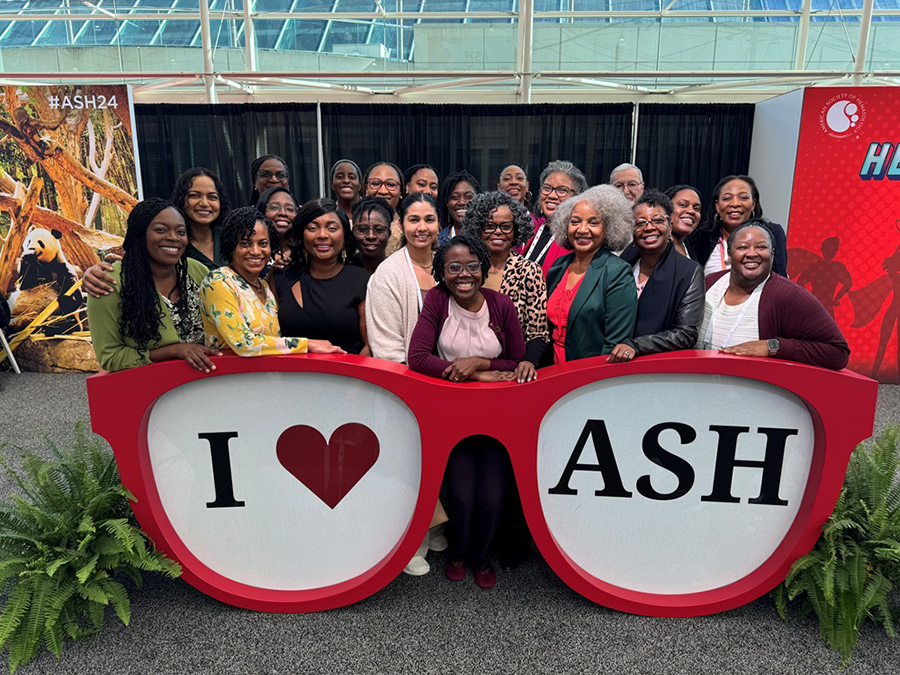
During all that time, Pace was advocating for babies and children with sickle cell disease.
“We had to fight for them. I went to Washington, D.C. There was a big consortium considering newborn screening for sickle cell disease and whether universal screenings should be implemented,” she said.
“Dr. Pace is just one amazing mentor, scholar and a wonderful person. She welcomes all with contagious energy, and that reassuringly voluminous laughter that reminds me of my mother.”
Solomon F. Ofori-Acquah, PhD, the Calvin Smyre GRA Eminent Scholar Chair at the Morehouse School of Medicine
According to Pace, there had been an assumption that only Black babies should be screened because of the predominance of sickle cell disease in the Black population.
“But how do you determine race? It’s important that every population be included so that you are addressing every race and ethnic background,” Pace reasoned.
“We supported universal screenings – every baby – and not only to test for sickle cell but for other diseases as well,” Pace recalled. “It took 10 to 15 years before every state came on board. It was a long fight, but it was pioneering work.”
And the world took notice.
In 2003, Popular Science magazine recognized Pace as one of the “Brilliant Ten” for her innovative efforts to find a cure for sickle cell disease, and the Dallas Morning News praised her as “A Great African American.” She was also recognized by her alma mater, the Medical College of Wisconsin, and was featured as a “Great African American Scientist” by the Franklin Institute of Science Museum in its 2004 Black History Month Exhibit.
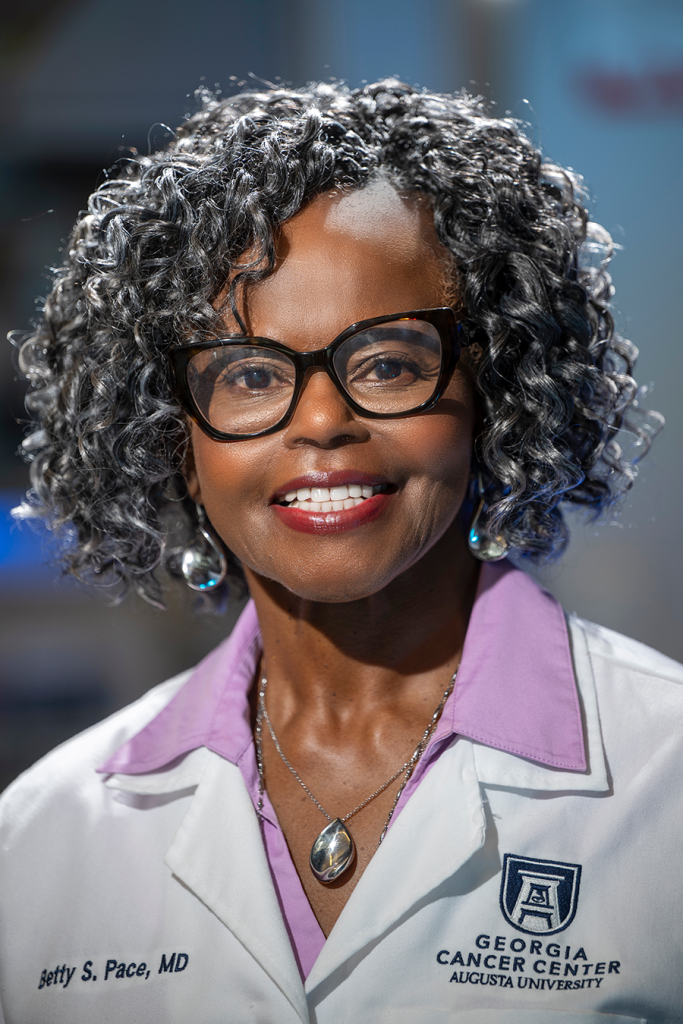
In 2007, the Sickle Cell Disease Foundation of California recognized Pace with a Lifetime Achievement Award for her outstanding contributions to the field of science.
Three years later, Pace was recruited to serve as the inaugural Frances J. Tedesco Distinguished Chair in Pediatric Hematology/Oncology, a position that supports much of her research. She also became the director of the Pediatric Sickle Cell Program for Children’s Hospital of Georgia, now part of the Wellstar MCG Health System.
“Dr. Pace is a globally known and respected researcher and mentor in the field of hemoglobinopathies, and I am proud of having contributed to her recruitment,” said Abdullah Kutlar, MD, a professor of Hematology/Oncology and director of the Center for Blood Disorders at MCG.
“Throughout our 15-year collaboration since her arrival to MCG, I have witnessed the success and admiration of her mentees on numerous occasions. She has a dynamic personality and is full of energy, which I have witnessed many times during our collaboration,” Kutlar said.
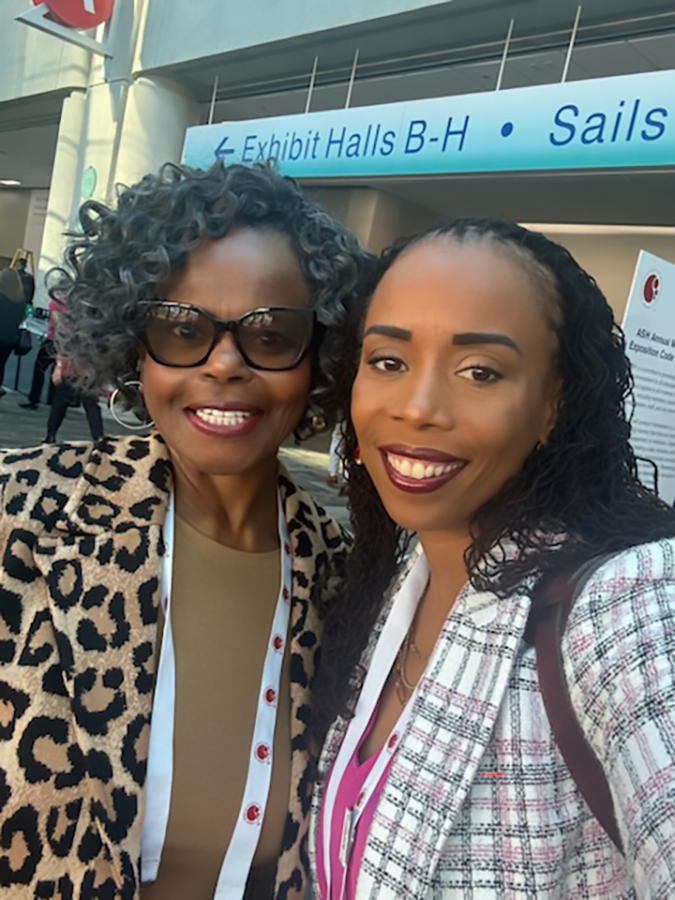
“It was a wonderful decision to come to Augusta. We have been very successful collaborating in the sickle cell programs,” said Pace, who has cared for more than 700 sickle cell patients and contributed to multiple research studies and several clinical trials over her 15 years at Augusta University.
She has helped to develop new drugs for sickle cell disease and currently has three NIH-funded studies through 2026, including a Phase I study in adults with sickle cell disease in partnership with Kutlar.
Because of persevering sickle cell investigators like Pace, the patient care and outcomes have improved drastically since her friend Phyllis died. Today, the median life expectancy for people with sickle cell disease is 42 to 47 years, and some people with milder symptoms live longer.
“It’s about developing new drugs and being able to treat patients better,” Pace said.
She also enjoys giving back and helping others through mentorship, and she has mentored more than 100 junior faculty over the past 19 years.
“I started off with students in my lab; then I applied to start the PRIDE program, and we have been going ever since,” said Pace.
PRIDE, an abbreviated name for the Programs to Increase Diversity Among Individuals Engaged in Health-Related Research, is a mentored research program that pairs young scientists with seasoned researchers to help junior faculty learn what it takes to advance their careers. The National Heart, Lung and Blood Institute awarded Pace one of the first three PRIDE program grants in the nation in 2006 while she was working at the University of Texas at Dallas. Pace brought the PRIDE program with her when she came to Augusta.
“Throughout our 15-year collaboration since her arrival to MCG, I have witnessed the success and admiration of her mentees on numerous occasions. She has a dynamic personality and is full of energy, which I have witnessed many times during our collaboration.”
Abdullah Kutlar, MD, professor of Hematology/Oncology and director of the Center for Blood Disorders at MCG
“I just love training. It is pure joy to see young people get their grants and contribute to the field,” said Pace. “My goal is to instill the confidence that ‘you can do this,’ especially to those who are underrepresented. Everybody should have some commitment to mentoring the younger generation. It’s hard work, but it is worth it.”
Pace, who has earned funding for PRIDE from the NHBLI through 2029, was recognized by the American Medical Women’s Association with the 2023 Woman in Science Award for her work in mentoring.
During a 2024 podcast of the Clinician Researcher, Toyosi Onwuemene, MD, an associate professor at Duke University School of Medicine and a former mentee, told Pace, “You were the first person who believed I could and gave me the tools I needed to move forward. I was doing heart transplant research when I met you. I am also a hematologist, and it really took you jumpstarting me, and that made a difference for me.”
The first post-doctoral candidate to be mentored by Pace was Solomon F. Ofori-Acquah, PhD, who currently holds joint faculty appointments at Emory University and Morehouse School of Medicine as the Calvin Smyre GRA Eminent Scholar Chair. He, too, is helping to fight sickle cell disease by leading the Georgia Solve Sickle Cell Initiative, coordinated by the Georgia Research Alliance in partnership with Emory, Morehouse and Children’s Healthcare of Atlanta.
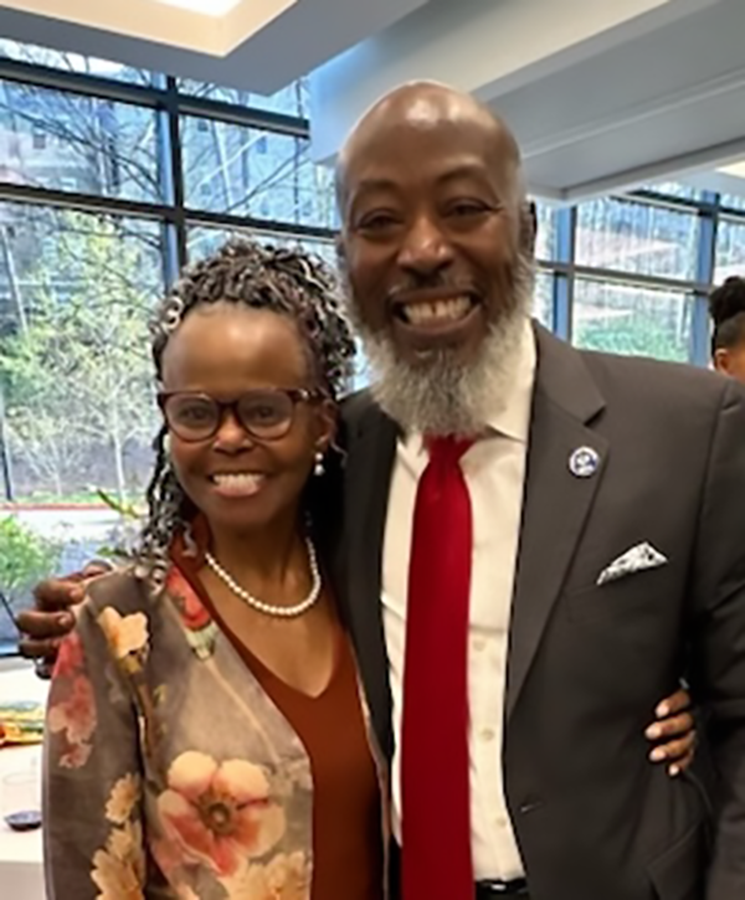
“Dr. Pace is just one amazing mentor, scholar and a wonderful person. She welcomes all with contagious energy, and that reassuringly voluminous laughter that reminds me of my mother,” said Ofori-Acquah. “I am truly inspired that she has decided to invest in the next generation of scientists with her personal finances. I am not surprised but still inspired.”
Not only does Pace leave a legacy for future students through the Betty S. Pace, MD Scholarship at MCG, but she also established a scholarship at her alma mater, the Medical College of Wisconsin, several years ago.
“We must invest in our young people,” Pace reiterated. “It’s important. We need to learn how to let go and give to the next generation.”
Find out how you can support student scholarships, academic programs, research or other educational opportunities at Augusta University by calling Philanthropy & Alumni Engagement at 706-721-4001 or email philanthropy@augusta.edu.
 Augusta University
Augusta University
